|
| |
This week in:
IPSI | Africa | Americas | East Asia | Europe & Central Asia | Middle East | South Asia
|
|
|
|
| |
This week in Sub-Saharan Africa
|
|
|
|
| |
DR CONGO: Rebels launch deadly attack in Beni region
On Tuesday, at least 10 people were killed and more than 10 others are missing in an attack by rebel group Allied Democratic Forces (ADF) in the northeastern outskirts of the city of Beni, North Kivu province. A local activist group, the Center of Study for the Promotion of Peace, Democracy, and Human Rights reported that machetes and hatches were the primary weapons employed. UN troops were sent to secure the area so that the DRC army could focus on the retreating attackers. Comment: While the United Nations and government blame the ADF, a rebel group, for the recent uptake of attacks, local sources have reported that some Congolese soldiers are also responsible. The attack occurred on the day the UN Security Council renewed its Congo peacekeeping mission for one year. (Xinhua, Aljazeera, Reuters)
|
|
|
|
|
| |
ETHIOPIA: Ruling coalition elects Abiy Ahmed as chairman
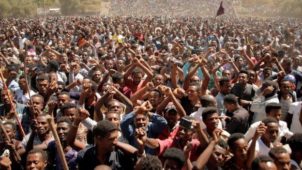
|
|
On Tuesday, the country’s ruling coalition, Ethiopian People’s Revolutionary Democratic Front (EPRDF), elected Abiy Ahmed as its new chairperson. The coalition controls all 547 seats of Ethiopia’s parliament – all but guaranteeing Ahmed’s confirmation as the new prime minister. If confirmed, he will become the first Oromo prime minister. According to the BBC, “opposition figures are cautiously optimistic about the future,” and Rwandan President Paul Kagame, who is the current chairman of the African Union, was the first African leader to congratulate Ahmed. Comment: Former Prime Minister Hailemariam’s sudden resignation led to the government establishing a six-month state of emergency to mitigate political upheaval. Anti-government demonstrations calling for more freedom have occurred among the Oromo and Amhara, who compose around 61 percent of Ethiopia’s population, for nearly three years. Since Ahmed leads the Oromo People’s Democratic Organisation, one of the four parties comprising the EPRDF, many hope he will be able to work with the military and pave the way for reforms. (Aljazeera 1, 2, Africanews, BBC)
|
|
|
|
|
| |
SIERRA LEONE: Runoff election injunction lifted with vote to be held on Saturday
On Monday, the Sierra Leone Supreme Court pushed Tuesday’s runoff presidential election to Saturday following the lifting of an injunction to halt the elections on accusations of fraud. The police are inspecting around 200 incidents of potential fraud – particularly ballot box over-stuffing. A total of 27 civil society organizations spoke against the injunction – saying the All People’s Congress (APC) intended to disrupt the election. Comment: On Saturday, people will vote for either Samura Kamara from the ruling party, the APC, or Julius Maada Bio from the Sierra Leone People’s Party. Bio scarcely won the original election but not by the required 55 percent of the votes. In wake of the injunction, the National Electoral Commission has temporarily banned polling materials. (Africanews, News24, DW)
Research/Written by Brian Adienge
|
|
|
|
|
| |
This week in the Americas & Caribbean
|
|
|
|
| |
BRAZIL: Residents blame police after at least eight people killed
On Sunday, at least eight people were killed in the Rocinha Favela during a police operation that residents are calling a revenge mission by the police force. Police claim they had been attacked by gang members, but residents counter that the police killed innocents in retaliation for a police officer who had been killed this week. Civilians in the region believe the final death toll may be higher than what has been released by the police. Cesar Munoz, a senior researcher at Human Rights Watch in Brazil, says he is concerned by police reports that injured citizens were taken to the hospitals: “We have documented many cases in the last decade in Rio de Janeiro in which officers delivered corpses to the hospital as a means of destroying crime scene evidence and hampering the investigation.” Comment: This operation comes five weeks after President Michel Temer placed the military in charge of security for Rio de Janeiro and eleven days after Rio councilor Mariella Franco was assassinated, following her denouncement of the police forces’ use of lethality. (Folha, Rio de Janeiro Informer, Guardian)
|
|
|
|
|
| |
ECUADOR: Two journalists and driver kidnapped near border
On Monday, three men working for Ecuador’s El Comercio newspaper were abducted near the village of Mataje. This area is known to have a large number of former FARC rebels who are discontent with the peace accords and are trafficking drugs. In the past few weeks this region has seen several attacks with homemade explosives on both police and infrastructure. Officials from Ecuador are in contact with the assumed kidnappers, and they believe the journalists been taken to Colombia. Comment: Ecuador has become increasingly worried about organized crime along the border in recent months, boosting their military presence in the area and urging Colombia to do the same. (BBC, Washington Post, Reuters)
|
|
|
|
|
| |
UNITED STATES: Reports surface that President Trump’s lawyer discussed pardons in regards to Russia Investigation
| |
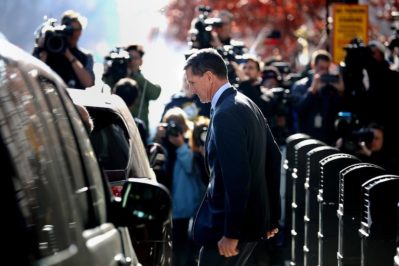
|
On Wednesday, it was reported by the New York Times that prior to his resignation, lawyer John Dowd discussed the potential pardoning of Michael Flynn and Paul Manafort, according to three unnamed sources. These pardons would be made in an effort to influence their decisions on plea deals in the investigation into Russian interference in the 2016 Presidential elections. The report suggests Dowd broached the topic of pardons with the lawyers working for Flynn and Manafort. It continues to imply that President Donald Trump’s team of lawyers were concerned about the information Manafort and Flynn would provide in exchange for more lenient sentences. It remains unclear whether or not President Trump was involved in these talks. Comment: With the public support behind Special Counsel Robert Mueller and his investigation, any effort to drastically halt his investigation would be met with nationwide protests, organized in around 700 cities through MoveOn.org. After the initial report broke, the White House released a statement claiming that there was “no discussion” of Trump pardoning Manafort. Dowd responded to these reports stating, “There were no discussions. Period. As far as I know, no discussions.” (Act.Moveon, Hill, NYTimes, Politico, Reuters)
Researched/Written by Connor Murnane
|
|
|
|
|
| |
This week in East Asia & Pacific
|
|
|
|
| |
CHINA: Kim Jong-un visits Beijing
On Tuesday, the Chinese state news agency, Xinhua, confirmed the speculation that the North Korean leader Kim Jong-un was in Beijing for an “unofficial” visit. The agency said the leader spent three nights in the country, during which he met with President Xi Jinping to discuss the issue of denuclearization. The confirmation came a few days after TV footage of a heavily-guarded North Korea train arriving in Beijing sparked speculation about Kim’s visit. The state media also reported that Kim Jong-un assured President Jinping of his commitment to denuclearizing the Korean Peninsula. Comment: This was Kim’s first foreign trip since taking power in late 2011. He also intends to meet with South Korean President Moon Jae-in and U.S. President Trump to discuss the current nuclear situation. (Xinhua, Aljazeera, The Guardian)
|
|
|
|
|
| |
MALAYSIA: Government proposes “Anti-Fake News” bill weeks before general elections
On Monday, the government brought new legislation before the parliament to combat ”fake news.” The government argued that the “Anti-Fake News” bill seeks to protect the country and its citizens from the harm of false information. The bill defines “fake news” as “news, information, data, and reports which is, or are wholly or partly false.” If this bill becomes law, offenders could face up to 10 years in jail or a fine of USD 128,000. National human rights groups and critics have criticized the government, arguing that it is attempting to use the bill to “steal” the upcoming elections. Comment: Malaysia is expected to hold general elections in the next few weeks. (BBC, The Guardian, Reuters)
|
|
|
|
| |
SOUTH KOREA: Government announces the date for upcoming inter-Korean summit
On Thursday, Cho Myung-gyun, the South Korean Unification Minister announced that the leaders from North and South Korea agreed to hold an inter-Korean summit on April 27th. The announcement follows the preparatory talks which were held in the village of Panmunjom inside the Demilitarized Zone. The summit is scheduled to be attended by North Korean leader Kim Jong-un and the South Korean President Moon Jae-in. Comment: This summit would be the third to occur since the 1950-1953 Korean war. The last summit was held in 2007. (The Straits Times, Aljazeera, CNN)
Researched/Written by Edgar Peter Mutta
|
|
|
|
|
| |
This week in Europe & Central Asia
|
|
|
|
| |
KOSOVO / SERBIA: Tensions rise as Kosovo deports Serbian official
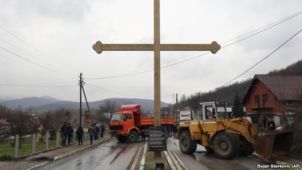
|
|
On Tuesday, Kosovo authorities deported Marko Djuric, the top official of Serbia’s office for Kosovo, from North Mitrovica for “illegal entry.” Djuric arrived in Kosovo to attend a discussion on improving “Serbian institutions” in Kosovo. Behgjet Pacolli, Kosovo’s Foreign Minister, claimed that Djuric did not follow the procedure of sending an entry request 72 hours in advance; however, Serbian President Aleksander Vucic rebutted that Djuric did follow procedures. Vucic said Kosovo’s actions “will not…go unpunished.” After the deportation, ethnically Serbian Kosovars showed their disapproval by leaving the parliamentary assembly to create a road block in Mitrovica. EU Foreign Policy Chief Federica Mogherini visited Vucic among the high tensions to help mediate relations with Kosovo’s Albanian President Hashim Thaçi. Comment: Mitrovica is known as an “ethnically divided town.” The incident occurred in the midst of EU-mediated talks between Kosovo and Serbia to resolve tensions for the purpose of gaining admission to the EU. (Balkan Insight, Independent Balkan News Agency, Radio Free Europe/Radio Liberty 1, 2)
|
|
|
|
|
| |
RUSSIA: Protests and vigils occur across multiple cities after a shopping center fire kills 64 people
| |
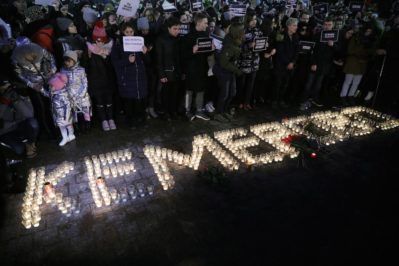
|
On Tuesday, thousands of Russians came to Pushkin Square for a vigil and protest following a fire in a Kemerovo shopping mall that killed 64 people, including many children. Protests occurred in more than 20 cities; families of victims and other citizens blamed the government for taking little action during the fire and withholding information. Some protesters asked for Kemerovo Governor Aman Tuleyev to resign, while others wanted more answers regarding the incident. Tuleyev was criticized for his description of demonstrators as “not relatives of the dead, but constant troublemakers.” First Deputy Governor of Kemerovo, Vladimir Chernov, claimed that the demonstration was created for the purpose of “discrediting authorities.” President Vladimir Putin said the fire was a result of “criminal negligence.” Comment: The demonstrations and vigils still took place despite Putin’s recent restrictions on “public gatherings.” (The Moscow Times, Radio Free Europe/Radio Liberty, The Guardian)
|
|
|
|
|
| |
REGIONAL: Twenty-Four European countries will expel Russian diplomats in support of UK
On Tuesday, 19 EU countries, 5 non-EU countries in the region, the U.S., Canada, and Australia announced their plans to expel a total of 122 Russian diplomats by next week. The announcements came in support of the UK’s expulsion of 23 Russian diplomats after Prime Minister Theresa May blamed Russia for an attack on ex-spy Sergei Skripal. May said this is “the largest collective expulsion of Russian intelligence officers in history.” Comment: Excluding the UK and U.S., Ukraine is expelling the largest number (13) diplomats, whereas EU and non-EU states are expelling one to four per country. (The Moscow Times, Al Jazeera, The Guardian)
Researched/Written by Daniel Boerger
|
|
|
|
|
| |
This week in the Middle East & North Africa
|
|
|
|
| |
EGYPT: President Al Sisi set to win a second term with 90 percent of the vote
On Thursday, Egyptian officials started counting votes after an election in which incumbent President Abdel Fattah al-Sisi faced no credible opposition. According to preliminary results reported by state media, Al Sisi is expected to win by 90 percent. The official results are due on April 2nd. If Sisi is elected, this will be his second term. His electoral campaign included a crackdown on all serious challengers. Comment: The election that kicked off on Monday has been largely viewed as a referendum on Sisi’s performance. The only other candidate in this election is Moussa Mustafa Moussa, a little-known politician who is understood to be as a supporter of Sisi. Moussa initially endorsed Sisi for a second term and even organized events to promote his nomination. (Aljazeera, CNN, The Independent, Reuters)
|
|
|
|
|
| |
IRAN: Iranian farmers stage protests in drought-hit Isfahan
On Friday, farmers in Iran’s eastern Isfahan province protested the government’s failure to ease a drought that has plagued the region for a decade. Approximately 97 percent of the country is experiencing some degree of drought, according to the Islamic Republic of Iran Meteorological Organization. Comment: Already in December and January, Iranian citizens staged nationwide protests over high consumer water prices and alleged corruption. Lack of water has posed a significant issue in rural areas over the last months. During nationwide demonstrations in December and January stemmed, at least 25 people were killed, and, according to one parliamentarian, up to 3,700 people were arrested. The current protests represent a significant challenge for the government of President Hassan Rouhani, who was reelected last year. (Anadoul, Reuters, VOA)
|
|
|
|
|
| |
SAUDI ARABIA: Houthi missile attack kills an Egyptian in Riyadh
On Sunday, Saudi Arabia announced that its forces intercepted a number of ballistic missiles fired by Houthi rebels from Yemen. The missiles targeted several locations in the kingdom. Colonel Turki al-Maliki, the spokesperson for the Saudi-led coalition, said that an Egyptian resident was killed from shrapnel – the first death in Riyadh since the country launched its military campaign against Yemen – while several others were injured. Muhammad al-Bukhaiti, a spokesman for the Houthis, told Al Jazeera that the attack was in “response to the bombing of Yemeni cities, and siege of the Yemeni people.” Comment: Houthi rebels have fired dozens of missiles into Saudi Arabia in recent months. An attack that targeted Riyadh’s airport on November 4 led Saudi Arabia and its allies to tighten their blockade of Yemen’s air, sea, and land borders. (Aljazeera, BBC, Reuters)
Researched/Written by Mohamed Ismail
|
|
|
|
|
| |
AFGHANISTAN: Car bomb near Helmand stadium kills at least 14 people
On Friday, a car bomb explosion killed at least 14 people and wounded more than 40 others in Lashkar Gah, a southern city in the Helmand province. The blast occurred outside of the Ghazi Muhammad Ayub Khan stadium during a wrestling match. A spokesperson for the Helmand provincial governor reported that the driver “wanted to go inside the stadium, but he was identified by the police, and he detonated himself” after driving into a crowd near the stadium’s entrance. No group has yet claimed responsibility for the attack. This attack comes two days after a self-proclaimed Islamic State-affiliated suicide bomber detonated an explosive device near Kabul University, killing 29 and wounding 52 people. Comment: Following the attack, dozens of women from Helmand joined a peace convoy on Tuesday – setting up a sit-in camp alongside the men’s camp at the stadium. Large areas of the Helmand province are under Taliban control, but government forces and U.S. airstrikes have prevented the Taliban from controlling Lashkar Gah. (TOLO News, Al Jazeera, BBC News, Reuters)
|
|
|
|
| |
INDIA: Journalist run down and killed by vehicle

|
|
On Monday, a vehicle struck and killed journalist Sandeep Sharma shortly after his undercover investigation produced footage of a senior police official accepting a bribe. The bribe bought permission to mine sand in a protected crocodile sanctuary in the Madhya Pradesh state. The editor of News World, the local television station where Sharma worked, claims that Sharma had received threats for his story but was denied police protection even though the police took the original recording of the footage he had collected. The police arrested the driver of the vehicle that struck Sharma, and the Madhya Pradesh chief minister, Shivraj Singh, ordered India’s elite Central Bureau of Investigation to investigate his death. Comment: Sand is a key ingredient in modern construction and the material is linked to increasing reports of corruption and violence as India’s urbanization continues to rise. One day prior to Sharma’s death, two journalists were also struck by a vehicle following a public argument with ex-village chief, Mohammad Harsu. (Dawn, Indian Express, Times of India, The Guardian)
|
|
|
|
|
| |
SRI LANKA: CCTV footage shows police and politicians joining anti-Muslim riots
| |
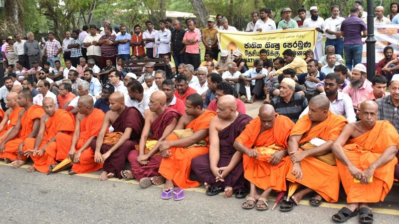
|
On Saturday, Reuters released a report that revealed how police and politicians joined the anti-Muslim riots in the Kandy district. Testimonies from witnesses, statements by officials, as well as CCTV footage comprise the report. Accounts by victims and witnesses – backed by CCTV footage – describe members of an elite paramilitary police unit, the Special Task Force (STF), assaulting Muslim clerics and leaders or, at minimum, doing nothing to stop Muslim mosques, homes, and businesses from being destroyed. The police and politicians in question were allegedly backed by former President Mahinda Rajapaksa and his right-wing party, Sri Lanka Podujana Peramuna (SLPP). Sri Lanka’s law and order minister accused the SLPP for the “well organized” violence. Former President Rajapaksa denies involvement by himself or the SLPP in the communal violence within the Kandy District. Comment: President Maithripala Sirisena imposed a 10-day state of emergency earlier this month due to communal violence between Sinhalese and Muslim civilians in the central Kandy District. A spokesman for the national police force said a special investigation unit is “probing the deficiencies of the police in the incident” and also investigating the involvement of politicians. (Colombo Page, Al Jazeera, Reuters)
Researched/Written by Pamela Mhute
|
|
|
|

|
|